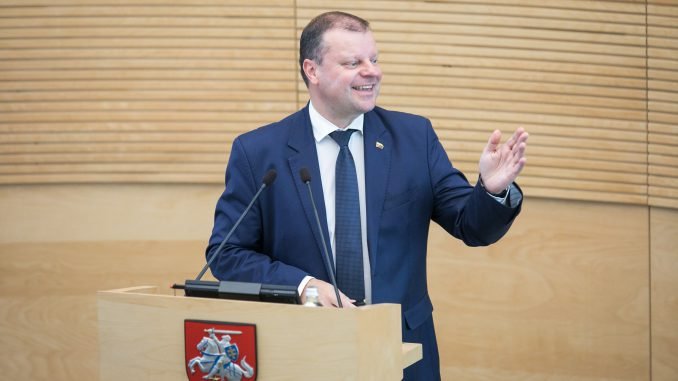
Prime Minister Saulius Skvernelis stood before the Seimas on Thursday. The head of cabinet answered questions posed by MPs in writing ahead of times regarding the majority leader Ramūnas Karbauskis‘ business relations with businessmen linked to Russian president Vladimir Putin. The LRT Investigation Department recently announced that Agrokoncernas buys fertiliser from the Russian company Minudobreniya via an intermediary in Dubai.
Some fifty questions were posed by ten MPs from the opposition Conservatives, Liberals and Social Democrats. The prime minister insisted that many of the questions were already answered.
He noted that the name of Russian oligarch Arkady Rotenberg, who owns Minudobreniya, appeared in classified reports, but was unwilling to explain the reason for these being classified.
Experts find no breach
S. Skvernelis explained that Ministry of Foreign Affairs experts reviewed the matter of importing Minudobreniya fertiliser via an intermediary, but the workgroup did not find the situation to be a breach of international sanctions.
The PM advised MPs, who believe that sanctions were breached nevertheless, to appeal to the Prosecutor General’s Office, which would evaluate whether to start a pre-trial investigation.
No information on R. Karbauskis posing a threat
The prime minister also stated he had received no data from intelligence structures, ranging from the State Security Department to the Second Investigation Department under the Ministry of National Defence, that R. Karbauskis poses a threat to national security. S. Skvernelis followed up by emphasising that all businessmen working in “an unfriendly state, the Russian federation, face a certain risk.”
According to PM Skvernelis, it is the businessmen involved, who have to evaluate the risks and the state can only act in a recommendatory fashion, advising of potential risks and threats linked to investment and trade links with the Russian federation.
Emphasised moral accountability
In his question to the prime minister, Conservative member Jurgis Razma emphasised moral accountability. He chided S. Skvernelis for what he describes as a passive, if not ironic tone when going through the questions, as well as a lack of interest in R. Karbauskis’ links to Russian oligarchs.
“But from a moral side, do you not understand that Lithuanian business, especially when it belongs to a Lithuanian politician, is retailing the goods of a Russian oligarch, who supports the Putin regime, thus helping him earn millions, which are then used by the Russian occupation structures in Ukraine, that thanks to this money, the defenders of Ukrainian freedom are shot? Is everything truly fine here on a moral standpoint?” J. Razma questioned,
To this, S. Skvernelis responded with irony, wondering, just what he should do to appease his colleague in the Seimas. In terms of moral accountability, he asserted that two incomparable matters were brought together by the opposition.
“In terms Lithuanian businesses’, a number of companies’, relations with the Russian Federation, I would like to remind that in terms of export structure, for four quarters now, even years in a row, this country has been in first place. Due to this, I mentioned what risks arise when cooperating with this state. Businesses must evaluate potential threats themselves, including threats related to public or national security.
If there is data or circumstances, which allow to believe that perhaps some legal norms are breached that are linked to sanctions on companies or individuals in the Russian Federation, our institutions must react to it,” S. Skvernelis stated, also turning to the matter of Ukraine, reiterating the Lithuanian government’s support for the Ukrainian government and people.

Be the first to comment